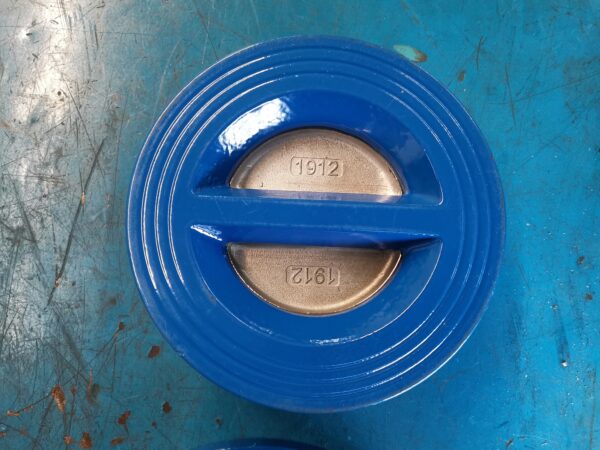If you are specifically asking about materials for a wafer check valve, let’s discuss some common materials used in the construction of wafer check valves and their advantages:
Ductile Iron:
- Good strength and durability.Cost-effective compared to some other materials.Resistant to corrosion.
- General-purpose applications.
- Excellent corrosion resistance.Suitable for corrosive environments.High strength.
- Chemical processing, water treatment, corrosive fluid applications.
- Cost-effective.Good durability.
- General-purpose applications.
- High strength.Suitable for high-pressure applications.
- Industrial and high-pressure applications.
- Enhanced strength and corrosion resistance.Suitable for high-temperature applications.
- High-temperature and high-pressure environments.
- Good corrosion resistance, particularly in seawater.Suitable for marine applications.
- Marine and offshore applications.
Ductile Iron:
- Good strength.Cost-effective.Resistant to corrosion.
- General-purpose applications.
- Excellent corrosion resistance.Suitable for corrosive environments.High strength.
- Chemical processing, water treatment, food processing.
- High strength.Suitable for high-pressure applications.
- Industrial and high-pressure applications.
- Enhanced strength and corrosion resistance.Suitable for high-temperature applications.
- High-temperature and high-pressure environments.
- Excellent chemical resistance.Low friction.
- Chemical processing, pharmaceuticals.
- Excellent chemical resistance.Suitable for water and chemical applications.
- Water treatment, chemical processing.
How does the single disc wafer check valve material perform in terms of tensile strength and hardness?
The performance of a single-disc wafer check valve material in terms of tensile strength and hardness is dependent on the specific material chosen for its construction. Different materials exhibit varying mechanical properties, and manufacturers select materials based on the requirements of the application.
Below are some common materials used in the construction of single-disc wafer check valves, along with information about their typical tensile strength and hardness:
- Ductile Iron:
- Tensile Strength: Typically ranges from 60,000 to 100,000 psi.
- Hardness: Measured on the Brinell scale, typically ranging from 170 to 240 HB.
- Cast Iron:
- Tensile Strength: Generally in the range of 20,000 to 60,000 psi.
- Hardness: Measured on the Brinell scale, typically ranging from 180 to 240 HB.
- Stainless Steel (e.g., CF8, CF8M):
- Tensile Strength: Varies based on the specific alloy, but can range from 70,000 to 100,000 psi or higher.
- Hardness: Measured on the Rockwell scale (typically Rockwell B or Rockwell C), can range from 75 to 90 HRB or 15 to 30 HRC.
- Carbon Steel:
- Tensile Strength: Typically ranges from 60,000 to 90,000 psi.
- Hardness: Measured on the Brinell scale, typically ranging from 120 to 200 HB.
- Alloy Steels (e.g., Chrome-Molybdenum Alloys):
- Tensile Strength: Higher than carbon steel, often exceeding 100,000 psi.
- Hardness: Can vary based on the specific alloy, but generally higher than carbon steel.
It’s important to note that these values are approximate and can vary based on the specific grade or alloy of the material, heat treatment, and manufacturing processes. The selection of a material for a single-disc wafer check valve depends on factors such as the operating environment, fluid characteristics, pressure and temperature requirements, and corrosion resistance.
For precise information on the tensile strength and hardness of a specific single-disc wafer check valve material, it is recommended to consult the valve manufacturer’s documentation, which typically includes material specifications and testing data. Additionally, industry standards such as ASTM (American Society for Testing and Materials) or ISO (International Organization for Standardization) may provide guidelines for material properties and testing methods.
